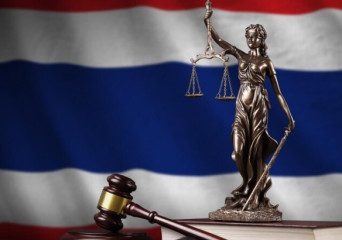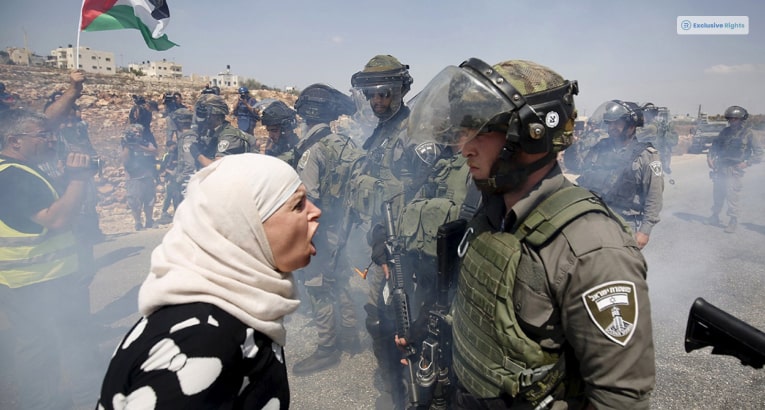
Table Of Contents
- Families Separated And The Death Toll
- The Death Toll
- Israeli Response
- Humanitarian Crisis
- Who Are The Hamas?
- Hamas’ Origin - The First Intifada
- Hamas Attack and Its Motives
- What Was The Hamas Attack About? Who Is Mohammed Deif?
- The Raid
- Human Rights Violations In The Israel-Palestine Conflict
- Apartheid and Discrimination
- Unlawful Attacks and Killings
- Forced Evictions and Home Demolitions
- Inhuman Treatment and Restrictions
- The Refugee Crisis
- Displacement and Immigration Policies
- Final Word: What Measures Has The UN Taken?
- UN Efforts for Peace and Relief
Human Rights Violations – Israel And Palestine At War
The European Union has declared that it expects Israel to adhere to International Law. Furthermore, on the other side, Israel and US leaders, Netanyahu and Biden, delivered statements on the attack.
Netanyahu promises to put an end to the Hamas violence. Meanwhile, international political tension seems to be constantly on the rise.
Families Separated And The Death Toll
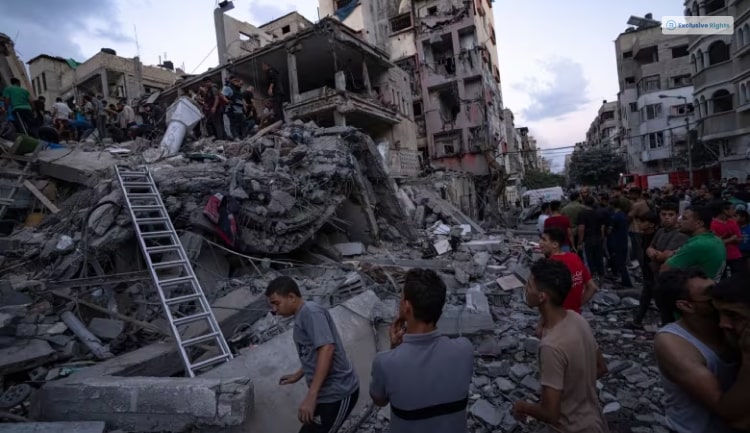
A mother sees her daughter on the back of a Hamas truck. She has not seen her since. However, she holds out hope that her daughter is still alive.
The Death Toll
The Palestine government data shows more than 1,000 of its citizens are dead in the disputed Gaza territory.
- On the other side, Israel reports nearly 2000 people dead after the devastating Hamas attack on Israel.
- The Israeli Defence Force reports on how difficult it has been to identify the victims’ bodies.
- They say that people set the remains of the victims on fire.
Israeli Response
Meanwhile, the death toll keeps rising as the Israeli government strikes back.
- The Israeli government has been launching back-to-back airstrikes to hit Palestinian residential areas near Jabalia and Qizan al-Najjar.
- The Israeli government has cut out the electricity supply to the entire Gaza Strip to control the war.
- Authorities fear limited food and water supply.
Humanitarian Crisis
Now, amidst the unfortunate events, most of the world is left wondering what will come next.
- The citizens of both nations are suffering in this wildfire of political vendetta.
- Big names continue to fight over the Gaza Strip while refugees and war victims shed blood and tears. So, where did it all begin?
Who Are The Hamas?
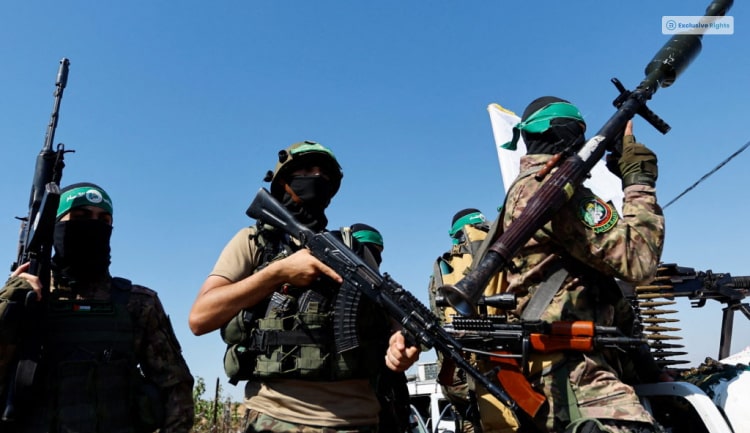
Hamas is a militant organization that originates in the decades-old Israel Palestine Controversy.
- They primarily operate in the disputed territory of the Gaza Strip, a densely populated coastal region.
- Israel and Palestine have claimed that Gaza belongs to them for years.
- Meanwhile, the two million people considering Gaza their home seem stuck in this political power battle.
Hamas’ Origin – The First Intifada
The Hamas came into prominence after the First Intifada, which resisted the idea of a two-nation theory.
- Members of the Hamas have been publicly fighting for what they claim to be a “free Palestine” since 2007. There have been four major wars since then.
- Additionally, the U.S. government and its allies consider the militant group to be a terrorist organization.
Hamas Attack and Its Motives
After the battle of Gaza, the organization won the election. It came into power and formed the government of the Gaza territory.
Since then, its only motto has been to promote Israeli disengagement.
What Was The Hamas Attack About? Who Is Mohammed Deif?
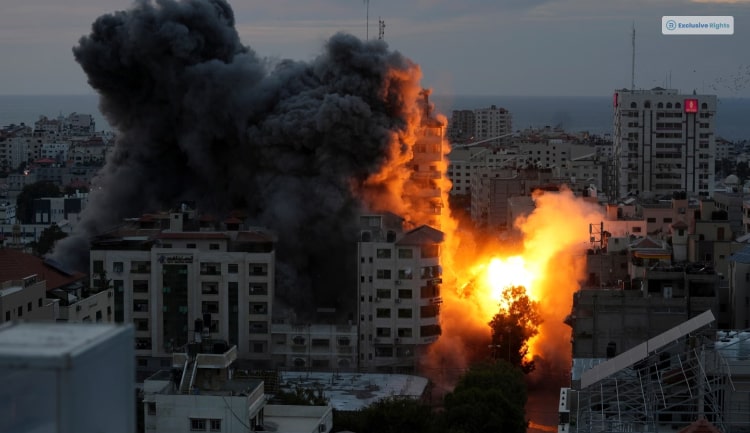
The Hamas launched its most recent attacks on Israel to continue its resistance. Sources are calling the attack “Operation Al-Aqsa Flood”.
- Furthermore, Mohammed Deif, the mastermind behind the attack, apparently planned it out.
- His motives stem from Israel’s retaliation and raid on Jerusalem’s Al Aqsa Mosque.
The Raid
The militant organization was infuriated when Israeli forces stormed into the mosque during the holy month of Ramadan.
- They hold that the raid was a deliberate disrespect to the citizens of Palestine who were in prayer during that period.
Human Rights Violations In The Israel-Palestine Conflict
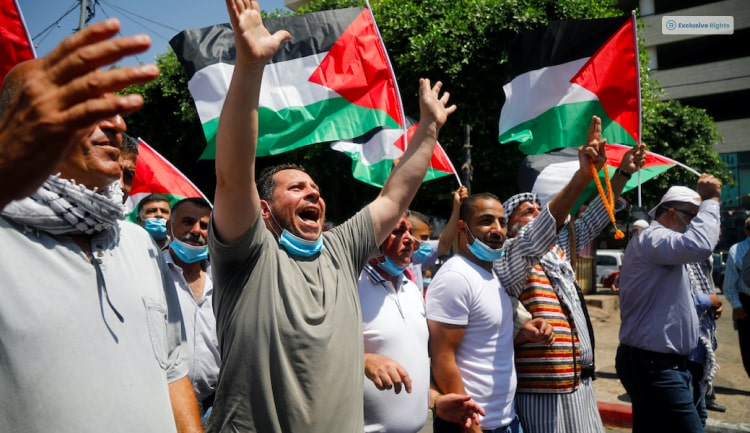
Today, as we write this blog piece on the despicable acts against humanity, we refuse to take sides.
- Rather, we will simply talk about the numerous and blatant violations of human rights that the people of Israel and Palestine have endured.
- The citizens are innocent bystanders. Moreover, due to this desperate political power struggle, they have lost their family and homes and are forced to live as refugees.
Apartheid and Discrimination
In the power struggle between the nations, apartheid was a common human rights violation.
- People endured oppression, torture, discriminatory treatment, and significant suppression of fundamental human rights.
- Furthermore, color, faith, and belief was the primary source of discrimination in this conflict.
Unlawful Attacks and Killings
Another dreadful consequence of war. Israeli and Palestinian forces have blamed each other for unlawfully killing the citizens.
- Additionally, both nations want complete and exclusive ownership of the Gaza Strip. Sources point to continued war crimes from both parties.
- Furthermore, the ones who suffer the most are the civilians, women, and children. There are multiple accounts of unlawful extrajudicial killing in the West Bank territory.
Forced Evictions and Home Demolitions
Palestinians of the Jordan Valley and Hebron Hills have reported facing forced evictions regularly.
- Residential facilities in the West Bank went through unlawful demolition. Furthermore, this led to hundreds of people losing their homes and livelihoods.
- Additionally, similar allegations come from the Israeli citizens living near the border who lose families and homes every day.
Inhuman Treatment and Restrictions
There are reports of authorities of both nations detaining individuals without sufficient cause, legal charge, or even a trial, including children.
- Furthermore, detainees from both nations undergo torture and ill-treatment at the hands of the military.
- Additionally, there is a severe restriction on the freedom of movement. Multiple checkpoints, roadblocks, and stringent permit regimes are a part of people’s everyday lives.
The Refugee Crisis
The Israeli-Palestinian conflict has led to an all-time high record in immigration. It has created a growing refugee crisis over the past few decades.
- Additionally, there have been multiple territorial disputes, political tensions edging on violence, and grotesque violations of human rights.
- It had led to the displacement of hundreds of people.
Displacement and Immigration Policies
The consequences of the Arab-Israeli war and the Six-Day War included the displacement of thousands of Palestinians.
Israelis living close to the border suffered the same consequences.
- Furthermore, a major part of the refugees took asylum in Jordan, Lebanon, and Syria under inhuman conditions.
- They have been living under challenging conditions without access to basic amenities.
- Furthermore, both communities have had to go through displacement to escape violence and find safety.
- Some Jewish communities have even immigrated back to Israel driven by political motivations.
By the looks of it, the immigration and displacement policies of the governments have given rise to further disputes in the region.
Final Word: What Measures Has The UN Taken?
The Israeli-Palestinian conflict has led to regional instability. It has sent ripples across the Middle East and even Europe.
There has been a constant battle for human rights amidst the ever-evolving immigration issues. Moreover, amidst it all, the United Nations continues to take measures against the instability and conflicts.
UN Efforts for Peace and Relief
These measures primarily target displacement, immigration, and refugee crises arising out of the conflict.
- Through its General Assembly and Security Council, the UN jointly passed resolutions. These contribute to active peacekeeping.
- Furthermore, they cater to the situation in Jerusalem and the rights of refugees.
- United Nations has even officially embraced the establishment of a Palestinian state.
- Other measures include the UN Truce Supervision Organization (UNTSO) and the United Nations Disengagement Observer Force (UNDOF).
- They carry out ceasefires and oversee the de-escalation of conflicts in the territories.
- Furthermore, the United Nations has even opened up a platform for dialogue between the two nations.
- It helps the disputed territories negotiate on border security, refugees, and governance.
- The United Nations Relief and Works Agency for Palestine Refugees in the Near East (UNRWA) looks into assistance through basic needs, such as food, healthcare, and education.
So this goes on to show that the United Nations continues in its efforts to alleviate the suffering of millions who reside in these disputed territories.
Read Also:





